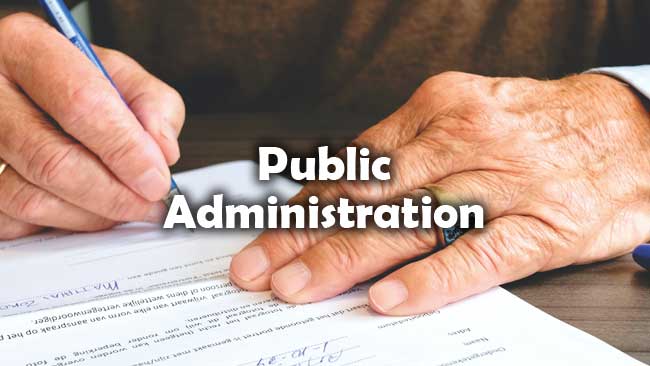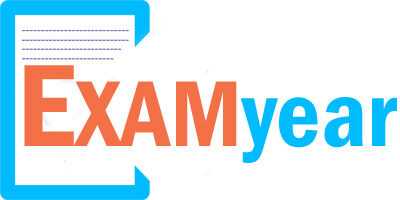UGC NET Public Administration Question Papers
UGC NET Public Administration Question Papers pdf will be available here for download. Therefore, all the contenders can make use of this chance and start to download the UGC NET Public Administration Solved Question Papers. Because by solving the UGC NET Model Papers you can improve your knowledge.

Also, check for download the UGC NET Public Administration Old Papers with Solutions from the link provided below as soon as it is released by the UGC NET. The UGC NET Solved Question Papers helps you to prepare well for the exam topic wise and obtain very good marks.
Therefore, go through this post thoroughly and download the UGC NET Public Administration Last Year Question Papers.
Public Administration Question Papers for UGC NET
1. According to Max Weber, there is the principle of fixed and official jurisdictional areas, which are generally ordered by :
(A) Rules
(B) Constitution
(C) Laws
(D) Legislature
2. Elton Mayo’s experiment to explore human attitude and sentiments by free expression of likes and dislikes is known as :
(A) Illumination experiment
(B) Relay test room experiment
(C) Ventilation therapy
(D) Bank wiring experiment
3. Assertion (A) : Under theory ‘Y’ integration of behaviour is the key process in management.
Reason (R) : It results in condition conducive for members to achieve their own goals as well as organisational goals. Answer the question using the codes given below :
Codes :
(A) Both (A) and (R) are true and (R) is the correct explanation of (A)
(B) Both (A) and (R) are true and (R) is not the correct explanation of (A)
(C) (A) is true but (R) is false
(D) (A) is false but (R) is true
4. ‘Every managerial act rests on theory’ is the basic hypothesis of :
(A) Herbert Simon
(B) F.W. Riggs
(C) Chester Barnard
(D) Douglas McGregor
5. Post-modern Public Administration theory had its origin in the results of :
(A) Scientific management
(B) Hawthorne experiment
(C) Minnobrook conference
(D) Comparative administrative group
6. New public service :
(1) Serves the customer
(2) Serves the citizens
(3) Emphasizes on productivity
(4) Emphasizes on public interest
Codes :
(A) (1) and (2)
(B) (2) and (4)
(C) (1), (2) and (4)
(D) (1), (2), (3) and (4)
7. In the Buddha period, the king was elected for a fixed period and was accountable for his action to :
(A) Amatya
(B) Parishad
(C) Janpada
(D) Sabha
8. Who was the Head of Province in the Mughal period ?
(A) Subhedar
(B) Diwan
(C) Fauzdar
(D) Prantpal
9. For the first time in India by which Act the Governor General of India was given the power of legislating ordinance ?
(A) Government of India Act, 1858
(B) India Council Act, 1861
(C) India Council Act, 1892
(D) Morley-Minto Reforms
10. How many committees were formed by the Constituent Assembly for the making of the Indian Constitution ?
(A) One
(B) Five
(C) Six
(D) Seven
11. Article 312 of the Indian Constitution provides for ………….
(A) Setting up of the central services
(B) Creation of the Union Public Service Commission
(C) Code of conduct for civil servants
(D) Creation of the All India Services
12. Who has the power to extend the functions of Public Service Commission ?
(A) President
(B) Parliament
(C) Prime Minister
(D) Chairman
13. The three basic Acts related to Police administration have their jurisdiction all over the country. These are :
(1) The Indian Penal Code
(2) The Code of Criminal Procedure
(3) The Indian Evidence Act
(4) The All India Service Rules
Codes :
(A) Only (1)
(B) (1) and (2)
(C) (1), (2) and (3)
(D) (1), (2), (3) and (4)
14. Which one of the given below is not a feature of planning in India ?
(A) Comprehensive in scope
(B) Multi-level
(C) Indicative
(D) Long-range planning
15. Which one of the following statements is not true regarding the Supreme Court of India ?
(A) Federal Court
(B) Court of Appeal
(C) A guardian of the Constitution
(D) A safeguard of the Government
16. Assertion (A) : Public Administration in India is not citizen-centric.
Reason (R) : Civil servants in India are not held accountable to the people.
Answer the question using the codes given below :
Codes :
(A) Both (A) and (R) are true, but (R) is not the reason of (A)
(B) Only (A) is true, while (R) is false
(C) Both (A) and (R) are true, and (R) is the reason of (A)
(D) Both (A) and (R) are false
17. Which one of the following is not under the purview of Governor ?
(A) He can reserve a bill for the consideration of the President
(B) He can make a report about the failure of the Constitutional Machinery in the State
(C) Article 239(2) which gives him certain functions when appointed to be Administrator of a Union Territory
(D) He can suspend the fundamental rights during emergency
18. The Governor appoints the Chief Minister of State according to the Article :
(A) Article 152
(B) Article 153
(C) Article 164(1)
(D) Article 165
19. State services are :
(A) Modelled on the basis of All India Service
(B) Controlled by State Governments
(C) Protected by the Constitution
(D) Regulated by the State Act
20. Who has given the title ‘Cold Hopping Collector’ for the account of the Collector ?
(A) Philip Woodruff
(B) O’Malley
(C) John Murray
(D) S.S. Khera
| GK | Old Question |
| MCQ | Previous Question |
| Quiz | UGC NET |
| Sample Question | IGNOU MPA |
| Model Papers | UPSC |
21. Assertion (A) : District Administration is the real strength and power of the State Government.
Reason (R) : ‘‘District Administration plays an extremely crucial role in assisting the policy makers in implementing their policies.’’
Answer the question using the codes given below :
Codes :
(A) Both (A) and (R) are true and (R) is the correct explanation of (A)
(B) Both (A) and (R) are true but (R) is not the correct explanation of (A)
(C) (A) is true but (R) is false
(D) (A) is false but (R) is true
22. Which of the following is not the objective of the Jawaharlal Nehru National Urban Renewal Mission ?
(A) Focussed attention to integrated development of infrastructure service in cities
(B) Ensuring adequate funds to meet the deficiencies in urban infrastructural services
(C) Special focus on urban renewal programme for the old city areas to reduce congestion
(D) To make more strong to urban local self-government
23. Which one of the following is not important issue in Municipal Waste Management in India ?
(A) Transfer of waste
(B) Collection Procedure
(C) Management
(D) Supervision
24. Which one of the following is not true about Mahatma Gandhi National Rural Employment Guarantee Act, 2005 ?
(A) It is the world’s biggest development project
(B) It is under the Panchayat Raj bodies
(C) It enhances decentralised participation in rural development
(D) 50 percent of its funds are to be spent directly by Gram Panchayat
25. Micro level studies on comparative administration focuses on :
(A) Comparison of administrative systems of two nations
(B) Comparison of local government in different countries
(C) Comparison of administrative system and its external environment
(D) Concerns with certain important parts of an administrative system
26. The approach which tried to establish linkages between the study of Public Administration and the institutions of Government is :
(A) Behvioural approach
(B) Institutional approach
(C) Structural-functional approach
(D) Ecological approach
27. The ecological perspective in the study of Public Administration was introduced primarily through the writings of :
(A) Robert Golenbiewski
(B) Ferrel Heady
(C) John Gaus
(D) Gunnar Myrdal
28. The dominant pattern of recruitment in USA is :
(A) Spoil system
(B) Special course certification system
(C) Patronage system
(D) Managerial approach
29. Bureaucracy acts as a tutelary element watching over society and protecting it from political extravagances in :
(A) USA
(B) UK
(C) France
(D) Japan
30. Scope of development administration according to Riggs does not cover :
(A) Physical environment
(B) Human activities
(C) Economic activities
(D) Government capacity
31. Which model of development supports the destruction of the capitalist economies ?
(A) Communist model
(B) Diffusion approach
(C) Human needs centered development
(D) Alternative development approach
32. This is not a widely accepted indicator of human development :
(A) Per capita income
(B) Life expectancy
(C) Human security
(D) Education
33. Social audit is not a way of :
(A) Ascertaining organization’s progress
(B) Measuring organization’s social performance
(C) Understanding organisation’s social performance
(D) Reporting organization’s social performance
34. The essence of New Economic Policy is :
(A) Outright privatization
(B) Liberalizing control system
(C) System change
(D) Closure of unviable units
35. The focus of Industrial Policy Resolution (1977) was on :
(A) Development of heavy industries
(B) Decentralised production
(C) Greater autonomy to PSUs
(D) Efficiency in public sector
36. Implementation of disinvestment policy suffers from :
(A) Lack of popular support
(B) Vested interests
(C) Political opposition
(D) Absence of commitment
37. Privatisation means :
(A) Distancing of public enterprises from government
(B) Taking control of private companies
(C) Joint venture with private companies
(D) Investing capital in private companies
38. Sale of Government shareholding of a central public sector enterprise of upto 50% or more along with transfer of management control is called :
(A) Privatisation
(B) Disinvestment
(C) Divestment
(D) Strategic Disinvestment
39. The underlying concept of Smart city is :
(A) Enhancement of quality rural services
(B) Sustainable integrated development
(C) Sustainable employment generation
(D) Rural transformation and rejuvenation strategy
40. States can borrow from within India if :
(A) Union Government agrees
(B) Loan is still outstanding with the Union
(C) State legislature approves
(D) State Finance Department approves
41. Which committee report is placed in parliament before discussion on demands is initiated :
(A) Finance Committee
(B) Estimate Committee
(C) Public Accounts Committee
(D) Privilege Committee
42. The benefit principle of taxation has given way to the principle of :
(A) Neutrality
(B) Equality
(C) Ability to pay
(D) Non-neutrality
43. Rosemary Sarri lists out the following activities of social welfare administration, which does not include :
(A) Translation of social mandates into operational policies and goals
(B) Design of organisational structures and processes through which the goals can be achieved
(C) Helping those who cannot help themselves
(D) Selection and engineering of the necessary technology
44. In India, the basic aims of a welfare state are clearly fore-shadowed in the :
(1) Preamble of the Constitution
(2) Fundamental Rights
(3) Directive Principles of the State Policy
(4) Eleventh schedule of the Constitution
(5) Twelfth schedule of the Constitution
Choose the correct code :
(A) (1), (2), (4) and (5)
(B) (3), (4) and (5)
(C) (4) and (5)
(D) (1), (2) and (3)
45. Who stated ‘‘social change refers to any modification in established patterns of interhuman relationship and standards of conduct’’ ?
(A) M.J. Jenson
(B) Lundberg and others
(C) Gillin and Gillin
(D) Davis
46. Affirmative action :
(A) Simply alters the composition of elite positions in society
(B) is a conventional redistributive system
(C) is an anti-poverty system
(D) is an employment generation system
47. Which one of the following is not a characteristic of voluntary agency ?
(A) Result of voluntary efforts
(B) Organised and governed on democratic principles
(C) Registered under relevant act
(D) No corporate personality
48. Under which Articles of the Constitution of India, seats are reserved for SCs and STs in the Lok Sabha and the State Legislature Assemblies in proportion to their population ?
(A) Article 338 and 339
(B) Article 146 and 244
(C) Article 19 and 49
(D) Article 330 and 332
49. Assertion (A) : Social welfare is a dynamic concept.
Reason (R) : It is the responsibility of the community and the state to promote the well-being of the underprivileged and disadvantaged people of society.
Answer the question using the codes given below :
Codes :
(A) Both (A) and (R) are true and (R) is the correct explanation of (A)
(B) Both (A) and (R) are true but (R) is not the correct explanation of (A)
(C) (A) is true but (R) is false
(D) (A) is false but (R) is true
50. The Supreme Court Judgement which made it mandatory for all government departments to consider the name of mother along with father for all practical purposes ?
(A) Vishakha Vs. State of Rajasthan, 1997
(B) Laxmi Vs. Union of India, 2006
(C) Geeta Hariharan Vs. Reserve Bank of India, 1999
(D) Mary Roy Vs. State of Kerala, 1986

